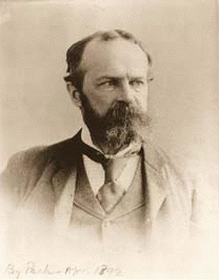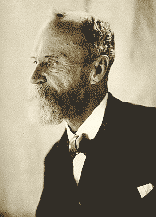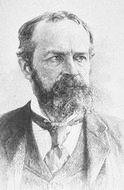 |
 |
John J. Chapman, a friend of William James
|
|
| Preface Chapter 1 - Psychology and the Teaching Art Chapter 2 - The Stream of Consciousness Chapter 3 - The Child as a Behaving Organism Chapter 4 - Education and Behavior Chapter 5 - The Necessity of Reactions Chapter 6 - Native Reactions and Acquired Reactions Chapter 7 - What the Native Reactions Are |
Chapter 8 - The Laws of Habit Chapter 9 - The Association of Ideas Chapter 10 - Interest Chapter 11 - Attention Chapter 12 - Memory Chapter 13 - The Acquisition of Ideas Chapter 14 - Apperception Chapter 15 - The Will |
Professor Christopher Green, of York University, has created a Classics in the History of Psychology internet resource site that includes the full text of The Principles of Psychology. The Classics Site has a mirror at Arizona State University that also houses The Principles.
|
VOLUME 1
|
|
VOLUME 2
|
| Chapter 17 - Sensation. Chapter 18 - Imagination. Chapter 19 - The Perception of 'Things.' Chapter 20 - The Perception of Space. Chapter 21 - The Perception of Reality. Chapter 22 - Reasoning. |
Chapter 23 - The Production
of Movement. Chapter 24 - Instinct. Chapter 25 - The emotions. Chapter 26 - Will. Chapter 27 - Hypnotism. Chapter 28 - Necessary Truths/Experience. |
From the Mead Project at Brock University. Transcribed by Lloyd Gordon Ward and Robert Throop. Table of Contents.
|
From the Mead Project at Brock University. Transcribed by Lloyd Gordon Ward and Robert Throop. Table of Contents.
| Preface Chapter 1 - The Function of Cognition Chapter 2 - The Tigers of India Chapter 3 - Humanism and Truth Chapter 4 - Relation between Knower and Known Chapter 5 - The Essence of Humanism Chapter 6 - A Word More about Truth Chapter 7 - Professor Pratt on Truth |
Chapter 8 - Truth
and its Misunderstandings Chapter 9 - The Meaning of the Word Truth Chapter 10 - The Existence of Julius Caesar Chapter 11 - The Absolute and the Strenous Life Chapter 12 - Professor Hébert on Pragmatism Chapter 13 - Abstractionism and 'Relativismus' Chapter 14 - Two English Critics Chapter 15 - A Dialogue |
|
 |
From the Mead Project at Brock University. Transcribed by Lloyd Gordon Ward and Robert Throop. Table of Contents.
| Editor's
Preface - Ralph Barton Perry. Chapter 1 - Does 'Consciousness" Exist?. Chapter 2 - A World Of Pure Experience. Chapter 3 - The Thing and Its Relations. Chapter 4 - How Two Minds Can Know One Thing. Chapter 5 - Affectional Facts/Pure Experience. Chapter 6 - The Experience of Activity. |
Chapter 7 - The
Essence of Humanism. Chapter 8 - La Nocion de Conscience (in French). Chapter 9 - Is Radical Empiricism Solopsistic. Chapter 10 - Mr. Pitkin's Refutation. Chapter 11 - Humanism and Truth Once More. Chapter 12 - Absolutism and Empiricism. |
|
|
|
|
 |
|